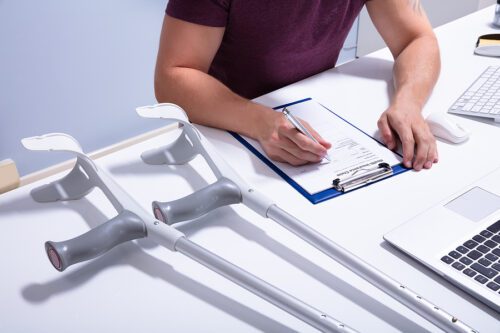
Can I Apply for SSDI While I’m Still on Short-Term Disability?
If you’re currently receiving short-term disability (STD) benefits through your employer, then you may be feeling a mix of relief and uncertainty. On one hand, it’s helpful to have some income support while you’re unable to work. On the other hand, what happens when your condition lasts longer than expected?
Many people in this situation wonder whether they can apply for Social Security Disability Insurance (SSDI) while still receiving short-term disability, or if they need to wait. You may. Timing is important, and navigating the overlap between private disability benefits and federal SSDI can be confusing. Understanding your options early may help prevent gaps in income.
How Short-Term Disability and SSDI Differ
On the surface, short-term disability and SSDI both offer financial support when you’re unable to work due to illness or injury, but they’re very different programs.
- Short-Term Disability:
Typically offered by employers or private insurance plans, short-term disability benefits are designed to cover a temporary medical leave. Not all employers have short-term disability plans. There can be a waiting period of a week or 2 where you do not get paid the disability. Policies vary, but coverage usually lasts from a few weeks to six months. These benefits may replace a portion of your salary, typically around 40% to 70% and are disbursed during the time you are unable to work. - Social Security Disability Insurance (SSDI):
SSDI is a federal program that provides long-term income support to people who meet the Social Security Administration’s (SSA) definition of disability. To qualify, you must have a medical condition that prevents you from engaging in substantial gainful activity (SGA) and is expected to last at least one year or result in death. SSDI benefits are based on your work history and the amount you’ve paid into Social Security.
The main difference? Short-term disability is temporary and private. SSDI is for disabilities expected to result in death or last a period of 12 or more months. SSDI benefits are federal benefits that can last until your retirement date with Social Security. Having the income from short-term disability available to support your family while you apply for SSDI is extremely helpful.

When You May Be Eligible to Apply for SSDI
If your health condition is expected to last at least 12 months (or it already has) or result in death, then you may be eligible to apply for SSDI. SSDI does not pay the 1st 5 months of your disability, so there may be a month that you receive SSDI while still receiving short-term disability benefits.
There’s no requirement that you have to wait until the short-term disability ends before starting your SSDI application. It may be a good idea to begin the SSDI process well before your short-term benefits run out. That’s because SSDI claims often take several months (or longer) to process, and many are initially denied.
Risks of Applying Too Soon vs. Waiting Too Long
The timing of your SSDI application may affect both your eligibility and your financial stability. Here are some common pitfalls to avoid:
- Applying too early.
If you apply before your doctor may provide adequate documentation of your condition’s severity or duration, then your application may be denied. The SSA wants to see medical evidence showing your condition is likely to last at least a year and that it’s impacting your ability to work. - Waiting too long.
On the other hand, delaying your application until after your short-term disability benefits run out may leave you in financial turmoil. SSDI applications may take months, and the SSA may not consider your condition “disabling” from the date your short-term disability ends unless there is clear, consistent documentation of ongoing impairment.
Early planning may help you avoid both scenarios.
Does Receiving Short-Term Disability Affect SSDI Eligibility?
Receiving short-term disability benefits does not automatically disqualify you from SSDI but may impact SSI applications.
Being approved for short-term disability may suggest that your condition is serious enough to warrant SSDI consideration, especially if your insurer or employer requires medical documentation.
However, the SSA and private insurers do not use the same definition of disability. It’s possible to qualify for short-term disability but still be denied SSDI if the SSA finds that you:
- Are capable of performing another type of work.
- Haven’t provided enough medical evidence.
- Don’t meet the 12-month duration requirement.
- Are still earning income above the SGA limit.
So while the two benefits can overlap, approval for one does not guarantee approval for the other.
Why Early Planning May Help Prevent Gaps in Income
Unfortunately, there is often a gap between the end of short-term disability benefits and the start of SSDI payments if you qualify. SSDI includes a mandatory five-month waiting period from your disability onset date before benefits can be paid. Depending on when you apply, that delay may already be partially or fully satisfied, but only if the SSA accepts your established onset date.
That’s why it may help to apply for SSDI as soon as it becomes clear that your condition may prevent you from working for 12 months or longer. Applying while you still have some financial cushion from short-term disability may give you a better foundation to wait out the SSDI decision process.
Keep in mind:
- You do not have to wait until your short-term disability ends to apply for SSDI.
- You may apply for SSDI once it’s medically clear that your condition is long-term.
- The sooner you begin, the sooner your claim may be processed (or appealed if necessary).
How Legal Guidance May Help
Applying for SSDI while still receiving short-term disability may raise important timing questions, especially about when to apply, how to document your condition, and how to avoid jeopardizing your eligibility.
An experienced SSDI attorney may be able to help you:
- Evaluate the right time to file based on your medical condition and STD timeline.
- Clarify and strengthen your medical evidence, including how long your condition is expected to last.
- Coordinate with your doctors to provide the correct language and documentation.
- Avoid conflicting information between your short-term disability and SSDI applications.
- Manage deadlines and track progress with the SSA.
Many SSDI attorneys work on contingency, meaning you may not owe a fee unless your claim is successful. We recommend you apply for SSDI and seek legal help if you get denied and appeal the SSA’s decision.
You Don’t Have to Navigate This Alone
Dealing with a serious health condition is hard enough. Worrying about income gaps, paperwork, or legal deadlines can make everything feel overwhelming, especially when you’re trying to recover or manage daily symptoms.
If your short-term disability is coming to an end or you already know your condition won’t improve quickly, then it may be time to explore the next step. Applying for SSDI while on STD isn’t just possible; in many cases, it may be the smart move.
Contact Arthur Law Firm right away at (419) 782-9881 for a free consultation to discuss your case. We’re here to help you understand your options, time your application correctly, and protect your right to benefits when your health keeps you from working.